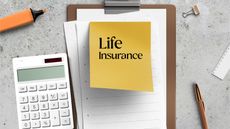1031 Exchanges: A Matter of Life and Death?
It pays to take the long view — sometimes the very, very long view — in examining 1031 exchanges.


In one of his most-cited quotations, Benjamin Franklin once observed that life offered us only two certainties: death and taxes. As of this writing, of course, Father Time remains undefeated, and the inevitability of death is still the bond that unites us all.
But the most knowledgeable real estate investors share a delightful secret about taxes, as they are often forced by circumstances to sell one property in pursuit of an even bigger and better opportunity.
They’ve found multiple ways to use like-kind exchanges, also known as 1031 exchanges, to defer payment of capital gains taxes … sometimes permanently.

Sign up for Kiplinger’s Free E-Newsletters
Profit and prosper with the best of expert advice on investing, taxes, retirement, personal finance and more - straight to your e-mail.
Profit and prosper with the best of expert advice - straight to your e-mail.
Sounds too good to be true? It’s not only possible, but feasible — so much so that many experienced real estate investors use 1031 exchanges as a feature of their estate planning!
Let’s review.
The basics of 1031 exchanges
Regular readers of this space know that a 1031 exchange is often used to defer capital gains taxes while upsizing an investment. By following the specific steps outlined in the Internal Revenue Code, a taxpayer can sell a piece of investment real estate and reinvest the proceeds in a like-kind piece of investment real estate of equal or greater value, deferring the need to pay not only capital gains taxes but also depreciation recapture taxes.
There are, of course, circumstances that sometimes require investors to sell their investment real estate before death and face an onerous tax bill. But for investors who do not face the need to liquidate before death, a 1031 exchange holds the key to protecting the financial gains that can accumulate over decades and avoid sticking their heirs with that massive tax bill.
The death benefit: A step-up in cost basis
Dennis Boyd had a prized investment that he bought while young and held throughout his life: an apartment building in a New York City suburb that had cost him the then-staggering sum of $65,000. Forty years later, the apartment building was still in great shape, generating an excellent income for Dennis and his family … and the fair market value had skyrocketed to an extraordinary $3.5 million.
Dennis was 60 and ready to retire. The income from the building would easily finance his retirement, but Dennis wanted to make sure his three children were taken care of after he was gone, and he didn’t trust their ability to work together to manage the building successfully after his death. So after consulting with his financial team, Dennis came up with the idea of relinquishing the apartment building in a 1031 exchange and buying three virtually identical rental properties, each one valued at $1.2 million.
The income generated by the three properties actually provides a small increase over what he was taking in from the apartment building, especially since each property required much less maintenance than the aging apartment building did. And the 1031 exchange is a home run from an estate planning perspective: It allows Dennis to designate each of his children as the heir to one of the properties. Dennis is in great health and plans to be around for a long while. But when he dies, the cost basis will step up to the then-current fair market value, so any potential capital gain or depreciation recapture taxes will be eliminated.
Each of his children can then make their own decision: cash out of the inherited property with no tax liability or continue to hold the investment and face tax liability based only on the gains from the date of their father’s death through the date they decide to sell the property. Of course, if they were paying close attention to their dad’s sophisticated strategies, they might each choose to engage in their own subsequent 1031 exchanges, deferring their own liabilities indefinitely. Or forever.
Either way, Dennis has likely saved a huge chunk of his children’s birthright simply by not just selling the original property and taking the cash.
A series of exchanges: The 'swap till you drop' approach
While Dennis availed himself of only a single 1031 exchange during his lifetime, any of his children may employ a different approach. One of the beauties of the 1031 exchange is that there is no limit to how many times you can use it to diversify your investment portfolio, upsize your investment properties or both.
Let’s assume that when Dennis dies, his daughter Cynthia inherits one of the investment properties with a stepped-up basis of $2 million, eliminating a capital gains tax liability on the $800,000 profit. She then exchanges up to a property with a $2.5 million value. Ten years later, she engages in another 1031 exchange to land a $3 million property. And, finally, several years before her own retirement, she exchanges the last property for a $4 million investment property in Southern California, where she spends the rest of her life.
A fraction of Dennis’ original $65,000 investment has blossomed into a $4 million investment property, in addition to what the other two children chose to do with their respective inheritances. And the Tax Man continues to collect exactly nothing in the way of capital gains or depreciation recapture taxes from the Boyd family.
Stepping away from active management: The DST solution
When Cynthia contemplates retirement, she knows that part of her retirement is also going to entail stepping away from active property management. As profitable as it might be for her, she won't want it to take up her time in retirement. So her team will guide her into the next 1031 exchange, this time into a DST, or Delaware statutory trust. This checks all the boxes for Cynthia: As a passive investment in which she’ll own shares of an attractive quality real estate trust, the DST will allow her the benefits of high-quality real estate ownership, with none of the hassles of property management. And since shares of a DST are easily divisible in a will, Cynthia is delighted that her estate planning needs are also satisfied, and her heirs will have the same 1031 options open to them that she had.
DSTs aren’t necessarily a perfect final solution, especially since the majority of them are designed to last no more than a decade, but Cynthia is confident that if the time comes, her team will be able to locate a suitable replacement and keep the 1031 exchange train rolling. Her family’s long and successful history with real estate investing is a testament to the value of a knowledgeable team of financial advisers and the extraordinary tax benefits available to investors in like-kind exchanges.
If you are an investor and wish to gain more knowledge, you can participate in our 1031/DST Masterclasses.
Daniel C. Goodwin, Provident Wealth Advisors and AAG Capital, Inc. are not attorneys and do not provide legal advice. Nothing in this article should be construed as legal or tax advice. An investor would always be advised to seek competent legal and tax counsel for his or her own unique situation and state-specific laws.
Related Content

Daniel Goodwin is a Kiplinger's contributor on various financial planning topics and has also been featured in U.S. News and World Report, FOX 26 News, Business Management Daily and BankRate Inc. He is the author of the book Live Smart - Retire Rich and is the Masterclass Instructor of a 1031 DST Masterclass at www.Provident1031.com. Daniel regularly gives back to his community by serving as a mentor at the Sam Houston State University College of Business. He is the Chief Investment Strategist at Provident Wealth Advisors, a Registered Investment Advisory firm in The Woodlands, Texas. Daniel's professional licenses include Series 65, 6, 63 and 22. Daniel’s gift is making the complex simple and encouraging families to take actionable steps today to pursue their financial goals of tomorrow.
-
 Charitable Remainder Trust: The Stretch IRA Alternative
Charitable Remainder Trust: The Stretch IRA AlternativeThe SECURE Act killed the stretch IRA, but a properly constructed charitable remainder trust can deliver similar benefits, with some caveats.
By Brandon Mather, CFP®, CEPA, ChFEBC® Published
-
 Three Ways to Take Control of Your Money During Financial Literacy Month
Three Ways to Take Control of Your Money During Financial Literacy MonthBudgeting, building an emergency fund and taking advantage of a multitude of workplace benefits can get you on track and keep you there.
By Craig Rubino Published
-
 Charitable Remainder Trust: The Stretch IRA Alternative
Charitable Remainder Trust: The Stretch IRA AlternativeThe SECURE Act killed the stretch IRA, but a properly constructed charitable remainder trust can deliver similar benefits, with some caveats.
By Brandon Mather, CFP®, CEPA, ChFEBC® Published
-
 Three Ways to Take Control of Your Money During Financial Literacy Month
Three Ways to Take Control of Your Money During Financial Literacy MonthBudgeting, building an emergency fund and taking advantage of a multitude of workplace benefits can get you on track and keep you there.
By Craig Rubino Published
-
 How Did O.J. Simpson Avoid Paying the Brown and Goldman Families?
How Did O.J. Simpson Avoid Paying the Brown and Goldman Families?And now that he’s died, will the families of Nicole Brown Simpson and Ron Goldman be able to collect on the 1997 civil judgment?
By John M. Goralka Published
-
 What Not to Do if an Employee or Loved One Is Kidnapped
What Not to Do if an Employee or Loved One Is KidnappedBusinesses need to have a crisis plan in place so that everyone knows what to do and how to do it. Sometimes, calling the authorities isn’t recommended.
By H. Dennis Beaver, Esq. Published
-
 Why You Shouldn’t Let High Interest Rates Seduce You
Why You Shouldn’t Let High Interest Rates Seduce YouWhile increased interest rates are improving the returns on high-yield savings accounts, that may not be an effective place to park your money for the long term.
By Kelly LaVigne, J.D. Published
-
 Need to Build an Emergency Fund? Seven Steps to Get There
Need to Build an Emergency Fund? Seven Steps to Get ThereHaving a safety net can mean peace of mind on top of being able to maintain your lifestyle if a financial emergency strikes.
By Justin Stivers, Esq. Published
-
 Which Type of Life Insurance Is Right for You?
Which Type of Life Insurance Is Right for You?Life insurance isn’t a one-size-fits-all option. Here are the differences between term life, whole life and indexed universal life insurance.
By Jay Dorso Published
-
 What Happens Financially When You Work One More Year?
What Happens Financially When You Work One More Year?The impact of saving more, spending less later and benefiting from an extra year or more of compounding can be truly staggering.
By Andrew Rosen, CFP®, CEP Published